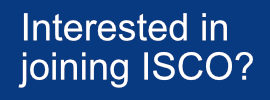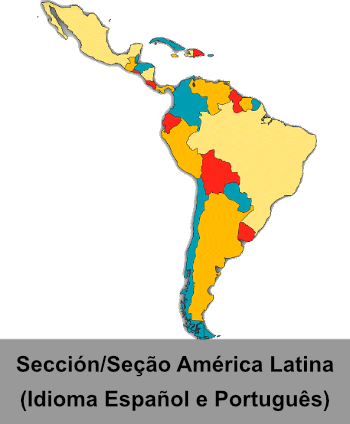LINK FOR JOINING ISCO’S 25th FEBRUARY ZOOM MEETING
Since our last Zoom meeting there has been quite a lot of correspondence between members of the “Way Forward” group – to try to keep you all “up-to-speed” on what has been going on, some progress reports have been sent to members of the group. Mary Ann Dalgleish will host the meeting. The link for joining the meeting is at – https://us02web.zoom.us/j/86187968173
Topics to be discussed will include –
1. Change of Secretary position from Matthew Sommerville to Neil Marson
2. Removal of members who are not in compliance.
3. Reaching out to potential new members, through articles in Newsletter and LinkedIn
4. New platform for communication between members
5. Add ISCO information to LinkedIn
6. Update website information
It is expected that the meeting will focus on progress being made by the “Way forward Group”. Non-members of the group will be able to join the meeting which will be open for all members and other interested parties. During the meeting ISCO Secretary Matthew Sommerville will be “handing over the baton” to his successor, Neil Marson who will be become the new Secretary of ISCO on 25th February 2021.
JANUARY 2021 ISCO ZOOM MEETING
All are invited to join ISCO’s next Zoom Meeting which is scheduled to take place on Thursday 21st January at 1400 EST and 1900 GMT and Friday 22 January 22nd at 0600 AEDT (or the equivalent date and time in your own time zone)
The meeting will be hosted by Mary Ann Dalgleish, VP (Membership).
To join the meeting please click on the link –
https://us02web.zoom.us/j/83170587931?pwd=dTl2ajFBdW00eXBDT2FFMkNPNDl5UT09
Just click this link shortly before the meeting start time and wait for the meeting to start.
Meeting ID: 831 7058 7931 Passcode: 367724
There is no formal agenda but members of the Secretariat have highlighted a few topics for discussion –
- Future ISCO leadership role and possibility of sharing duties
- Redefining ISCO’s mission and other actions to get more young people involved
- Better use of Linked-In to raise ISCO’s profile and create interest in membership
- Improvements to website to attract more traffic and increase awareness of the services ISCO provides
- Removal of Members for non-payment of annual dues
- Proposal for major improvement of the Online Directory of Supplies & Services
MINUTES OF THE ISCO 2020 AGM
This meeting was held remotely using the Zoom platform.
Date & Time – Friday 18th December 2020 at 15:00 EST, 20:00 GMT and Saturday 19th December 2020 at 0700 AEDT.
Attendees
David Usher, (President), Matthew Sommerville (Secretary), Mary Ann Dalgleish (VP Membership), John McMurtrie (VP Newsletter), Committee Members – Marc Shaye, Dan Sheehan, Captain Bill Boyle, and Council Members – Dr Merv Fingas (Canada), John Wardrop (Australia).
Other attendees included Philippe Binoit, Rupert Bravery, Nigel Collingwood, John Dawes, Graham Edgeley, Kurt Hansen, Vedran Martinic, Mark Orr, Anja Pilepic, Helena Rowland, John Zimmer, Mike Watson. Please note that this list is not complete as names of some attendees who did not speak will not have been recorded.
Apologies
M. Kerem Kemerli, Ed Levine, Neil Marson.
Agenda Voting Items
The submitted voting forms unanimously approved the motions on which Members were asked to vote and those attending the meeting expressed their approval with no dissensions.
Chairperson
Mary Ann Dalgleish (VP Membership) chaired the meeting which had a duration of 1 hour, 40 minutes.
Highlights of the Discussions
Mary Ann Dalgleish welcomed the attendees and asked everyone to send her an email to help in ensuring that her mailing list is complete and up-to-date.
In response to a question John McMurtrie advised that Members of ISCO Council were appointed by invitation from the Secretariat. On this matter it was noted that there were currently vacancies on the Council in Brazil and Greece. Captain Boyle undertook to speak to his contacts in Brazil to seek recommendations on the appointment of a new Member of Council for Brazil. Matthew Sommerville said he would do the same with his contacts in Greece.
Rupert Bravery introduced himself and informed the meeting about the co-ordinating roles he had with various organisations, including OSPRI, GI WACAF, and his close relationships with IMO, ITOPF and others. Rupert Bravery advised that he is due to retire in April 2021 and would have time to help ISCO to extend membership of its Council in the 22 countries involved in GI WACAF, and in the Caspian and Black Sea areas. In his experience with the GI WACAF countries he identified a large appetite amongst young people for acquiring environmental knowledge and thought there was a high potential for ISCO development.
Mary Ann Dalgleish proposed that from now on ISCO should hold monthly online meetings by Zoom. This proposal met with the general approval of those present. In regard to the time set for online meetings, the general view was that the time selected for the AGM was probably OK but any suggestions for variation would be considered
Marc Shaye spoke about the upcoming March seminar “Recognition Training for Struck-by and Caught-in-between Hazards” (details in ISCO Newsletter 767), requesting that it be discussed at a future meeting and asked members to send relevant case studies to him at [email protected]
John McMurtrie advised that ISCO policy included growing the representation of national environmental groups – such as NOSCA (Norway), SYCAPOL (France), the Dutch association and others – within an expanded ISCO Council.
Marc Shaye spoke of the RESPONSECON contracts developed by ISCO and BIMCO and volunteered to help find out who is using these contracts and get feedback on experience in their application. Matthew Sommerville said that information could be difficult to get because of commercial sensitivities but, provided that info on their clients is not asked for, it should be possible. He also said it was time to remind people about the availability of the RESPONSECON contracts and the benefits for members and responsible parties who adopt their use.
John McMurtrie said that he thought ISCO would benefit from sharing information and building on its already good relationship with BIMCO – perhaps looking at reciprocal membership.
Matthew Sommerville reminded attendees that within the RESPONSECON contracts it was left for response contractors to insert their own rates for personnel and equipment use. He recommended that, as a kind of “add-on” it would be useful to develop a formula that could be used to calculate and justify charging rates. With fewer spills these days high cost response equipment may only be earning revenue for only a few times over a period of years – but costs, including capital invested, depreciation, maintenance, insurance, training, exercising, warehousing, etc. continued and, of course, there had to be a reasonable provision for profit.
Mary Ann Dalgleish, Dan Sheehan and Marc Shaye all spoke about the use of Linked-in – Currently ISCO has its own Linked-in page and is also a member of the “Oil Spill Professionals” page. Dan Sheehan, Marc Shaye and Mike Watson volunteered to look into options to increase the effective benefit for ISCO in the way we use the Linked-in facility. Mike Watson already posts a link for downloading the latest ISCO Newsletter every week and on a more occasional basis John McMurtrie posts news about ISCO activities. Mike Watson recommended that selected stories and reports in the ISCO Newsletter should be re-posted on Linked-in pages to make for a more interesting mix of content.
Rupert Bravery advised that, the last time he checked, the ISCO Linked-in page had only 146 members where the number should be in the ‘000s. He identified a need to improve this dramatically. At the same time, he said that other social media, such as Twitter and Facebook, should be avoided as the ratio of benefit to time expended was very poor.
Mary Ann expressed some uncertainty concerning the validity of Campaign Monitor reports on the numbers of “opens” and “clicks” to download the ISCO Newsletter. John McMurtrie said that over 3,000 copies of the weekly newsletter are sent out to subscribers every week to subscribers. However, the CM reports indicate that only about 700-800 subscribers actually download and read the newsletter during the period monitored by CM. The actual number of people who do read the newsletter could, he thought, be anywhere between 2,000 and 5,000. Matthew Sommerville said that many large companies and organisations would be reported by CM as single person readers but in reality will be circulating the newsletter internally to large numbers of staff. The newsletter is also accessed by readers via links on the ISCO website and on the Linked-in page – but, of course, these numbers are not included in the CM reports.
John McMurtrie said that every week the CM reports advises “no shares”. He does not understand what this means and is wondering if ISCO is missing out – could it be that there is an option for setting up some automatic mechanism for forwarding the newsletter to social media or other potential readers? It’s not easy to get answers to questions.
David Usher recommended that ISCO should be routinely be providing the newsletter and other information to insurance groups, members of BIMCO, etc. He also recommended that we should ask members and newsletter readers more questions about their expectations of ISCO. Marc Shaye and Rupert Bravery both said that we should make a concerted effort to learn more about the concerns of our members and push harder to get more feed-back.
Capt. Bill Boyle raised the question – “How to get more young people involved?” He related his experience in large scale training of responders in Brazil, Rupert Bravery said much the same in regard to the response to webinars provided by GI WACAF for the 22 countries in west and central Africa – Both said that there are lots of young people keen to learn and become more involved.
Mary Ann said the younger generation are not just interested in spill response – they are interested in the wider area of environmental protection. John Zimmer said that they are also interested in the response to natural disasters – hurricanes, earthquakes, etc. some of which cause pollution.
Capt. Bill Boyle brought the matter of finding a new Secretary for ISCO back into focus. John McMurtrie reported that one nomination had been received and that this candidate had first class credentials for the position. He did not disclose a name because discussions were at an early stage and permission had not been given at this time. Matthew said that the workload involved was quite onerous and we would need someone who could devote the amount of time required. The option for work sharing should be explored.
Rupert Bravery said that he would be happy to help. His experience and good relationships with IMO, IOGP, GI WACAF and other organisations would be of useful. He went on to stress the importance of developing a strategy that would define the ultimate purpose of ISCO and how we can work together to achieve clearly stated objectives. John Dawes, John McMurtrie and several others endorsed this policy.
Mary Ann Dalgleish reminded everyone that better funding must be a prime objective. The reality is that we need more paying members. David Usher recommended we encourage directors and others at high levels in companies by introducing ideas that could be promoted in setting policies. Rupert Bravery stressed the need to involve practitioners and people with crisis management responsibilities.
John Wardrop said that success would very much depend on identifying responsibilities – who does what and each person to accept responsibility for fulfilling his/her part in the plan.
SUMMARY
- There was a consensus that the online meeting was useful and it was agreed that further online meetings be held on a monthly basis.
- The majority of those who spoke at the meeting made personal commitments to help ISCO in various ways.
- There was support for the development of a forward strategy for growing the organisation with particular emphasis on involving the younger generation.
- The meeting recognised that improved funding was a primary concern and that recruitment of more paying members must be a priority.
- Improved communication between the organisation and its members should be pursued with emphasis on understanding expectations and getting more feedback.
- The meeting recognised that there was a need to raise ISCO’s profile – there are far too many people who are not aware of the organisation and what it sets out to achieve.
2020 AGM
The 2020 AGM is being held online using Zoom. Please refer to “Letters to Members” for link for downloading the Agenda and Instructions on how to join the Online Meeting.





